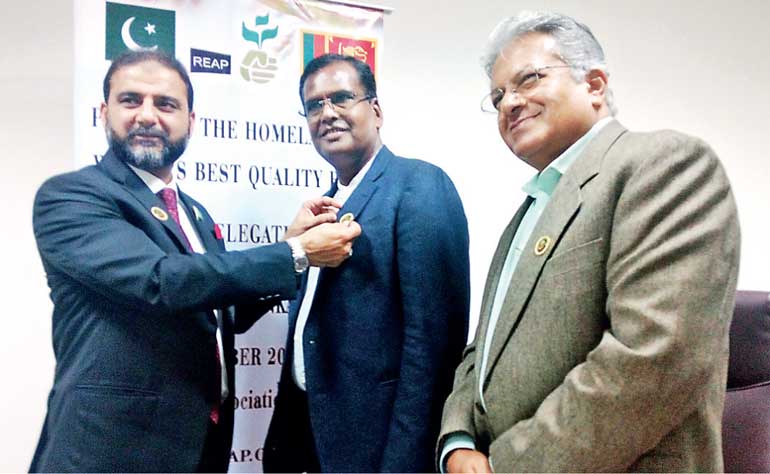Friday Feb 27, 2026
Friday Feb 27, 2026
Monday, 18 December 2017 00:00 - - {{hitsCtrl.values.hits}}
The first ever meeting between Pakistan’s sole rice exporter grouping REAP and Sri Lanka’s essential commodities import conglomerate EFCITASL was successfully wrapped in Colombo on 14 December despite coming up short on high expectations of a rice trade deal between the two.

Rice Exporters Association of Pakistan Chief Executive Rafique Suleman (left) felicitates Essential Food Commodities Importers and Traders Association of Sri Lanka President G. Rajendren (centre) and Essential Food Commodities Importers and Traders Association of Sri Lanka Past President Nihal Seneviratne in Colombo on 14 December
“Our first ever talks with the Essential Food Commodities Importers and Traders Association of Sri Lanka (EFCITASL) were better than expected. The EFCITASL membership was very, very interested in our rice. However, the rice import tax structure of Sri Lanka on Pakistan rice is not helping and as a result EFCITASL members are not committing immediately,” said the Chief Executive of REAP (Rice Exporters Association of Pakistan) Rafique Suleman after their meeting with EFCITASL in Colombo on the eve of 14 December.
REAP’s Suleman was speaking after their first ever meeting with EFCITASL team led by its President, G. Rajendren (Chairman of Gnanam Imports Ltd. of Colombo). “Though other rice imported to Sri Lanka are taxed only 25 Sri Lankan cents (Rs. 0.25) per kilo this is not so for rice coming from Pakistan. Basmati rice is taxed SL Rs. 50 per kilo. Even each kilo of Pakistani non-Basmati and long grain rice imported to Sri Lanka are subjected to the same import tax of SL Rs. 50 similar to Basmati instead of charging the low tax of SL cents 25. As a result importers with EFCITASL are not committing immediately. Sri Lanka’s majority rice buyers consider rice costs when they purchase, therefore this import tax is a hindrance. On the other hand, if this tax is removed on our rice, I believe that the annual rice imports from Pakistan can immediately grow three-fold to $ 30 million from present $ 9 million. WE than the Minister of Industry and Commerce Rishad Bathiudeen for calling a report on the import tax on Pakistani rice to Sri Lanka.”
EFCITASL President G. Rajendren confirmed that significant progress was made in their talks with REAP. “Our first ever talks with REAP are successful and we are interested in importing from Pakistan,” said Rajendren whose 125 EFCITASL member companies directly handle more than 90% of annual rice and other essential item imports to Sri Lanka thereby regularly helping the country to maintain low prices in its household consumer commodities basket. “We, EFCITASL feed the nation. We don’t import expensive items. We believe their (REAP’s) prices could be reduced further and tax reduction for them could also help. We are looking to start with Pakistan after the domestic rice market stabilises from its current fluctuations.”
In 2016, 3% of all imports from Pakistan to Sri Lanka are Pakistani rice at $ 9.35 million (declining from $ 12 million in 2015). Rice was the eighth product imported to Sri Lanka from Pakistan in 2016 (number one was cotton, at $ 75 million followed at second by Portland Cement at $ 65 million).
On 12 December, Minister of Industry and Commerce of Sri Lanka Rishad Bathiudeen called for a review of the taxes imposed on Pakistani rice imports to the country after REAP’s CE Suleman made his representations to Minister Bathiudeen in Colombo. Suleman was leading his 12-member visiting delegation from REAP, the collective of Pakistan’s largest privately owned rice exporting firms. Almost 1000 Pakistani rice exporters are under REAP. The voice of REAP is influential-in fact, REAP membership is compulsory for all rice exporters of Pakistan.